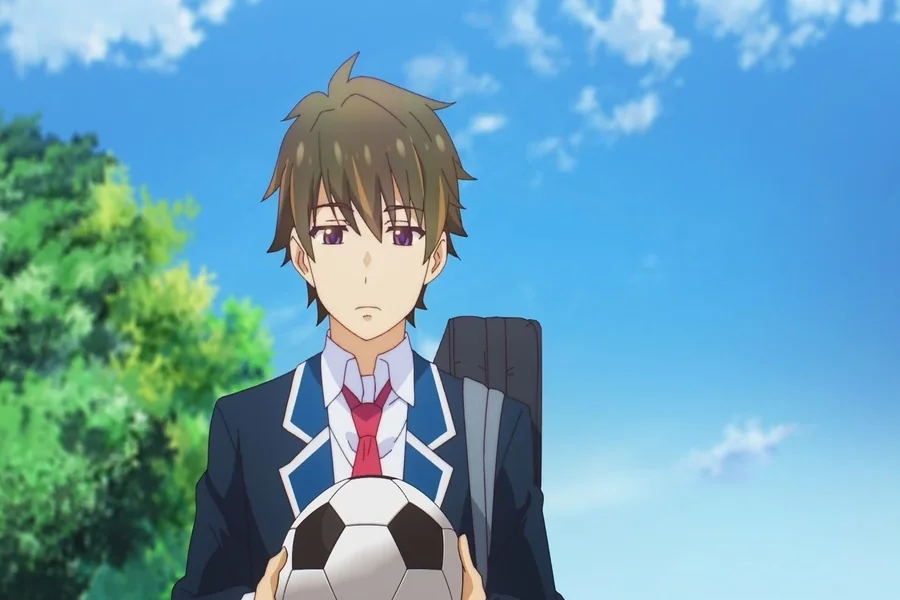Anime has ever been a broad and wide medium and there has always been something up its sleeve to satisfy each and every kind of viewer, be it epic battles, a political intrigue, or touching romance. One of such anime includes The Dreaming Boy Is a Realist, which seems to be a distinct anime based on its premise and the emotional content in it. Based on a well-known light novel series, this anime has found its fans because of its original approach to several elements of romantic comedy, investigation of the concept of idealism over realism, and its complex characters. It is the tale of romance, introspection, and self-discovery of what one feels in the world of tricks and misunderstandings.
In this paper we shall look at the themes of The Dreaming Boy Is a Realist, the plot that moves this story, its main characters and why this anime, which people find in websites such as Gogoanime, has been attracting interest and appreciation amongst its audiences.
Plot Overview: A Young Man Caught Between Idealism and Reality
The Dreaming Boy Is a Realist is a story of a high school student Aki Sora, who is not only active with his imagination and daydreams of the perfect romance. But, as opposed to other characters who might get lost to these fantasies, Aki is most conscious of the fact that his fantasies do not exist in the reality of the life. This qualifies him as a realist in the sense of living in the realities of the world he knows and lives in although his mind has a tendency to run off to think of idealism.
The story is unraveled with Aki falling under a serious boy crush on one Mikako Satsuki who is a very popular classmate of the teacher who is extremely admired by everyone. But Aki is self-conscious of himself and the world around him, thereby giving him some apprehensions on going directly after Mikako. He does not even feature in her life; he simply looks at her unnoticed at a distance and realizes the space that exists between how he imagines love and how he would actually go about having a relationship in real life. Mikako does not, however, realize Aki simply adores her and this leaves him conflicted since he tries to sort out his emotions.
The Idealistic Dreamer Meets Reality
The most interesting point of the story, The Dreaming Boy is a Realist is that it recounts the conflict between idealism and realism. Aki Sora is always stuck between the dream of a perfect situation: In it, Mikako will see him and they will have a magical love affair and what will stop things like that are the ugly truths of life which cannot permit such things to occur. There is a depth to his story which comes out in his inner conflict as a dreamer who realizes that his fantasies are not feasible. The realism that Aki possesses does not allow him to be impulsive but he is not able to get rid of his desires and thoughts in full.
This inner struggle serves as the cornerstone of the anime in general when it comes to investigating bigger issues related to personal awareness and development. Aki must be taught to compromise his idealistic ideals with the reality of his circumstance, and confront the reality of being rejected, the need and value of communication, and the embarrassment of human contact. The series in several aspects has been true to the typical experience of going through the romantic situation, particularly with the formative years in high school, where emotions may run high, yet clouded with the idealism of youth.
Characters: Complexity in Simplicity
While the story focuses primarily on Aki, the anime also explores the secondary characters who bring their own nuances to the plot. Aki’s relationships with his friends and Mikako provide him with opportunities to grow, reflect, and ultimately change as a person.
Aki Sora: The Dreamer With a Realist’s Mindset
Aki Sora, as the protagonist, is a fascinating character. His mix of romantic daydreamer and grounded realist makes him relatable and endearing. He does not idealize love or relationships in a way that completely clouds his judgment. Rather, he can see the flaws in both himself and others, which makes him mature beyond his years.
His internal monologues are insightful, revealing his thoughts about his unrequited love and his interactions with Mikako. Aki understands the futility of chasing after someone who might never return his feelings, but he cannot simply shut off his emotions either. This constant battle between his heart and his head, between fantasy and reality, is central to his character arc.
Mikako Satsuki: The Object of Affection
Mikako Satsuki is the girl of Aki’s dreams, but like many characters in anime, she is more than just a love interest. Mikako is popular, smart, and athletic — qualities that make her seem almost untouchable in Aki’s eyes. However, what the series reveals about Mikako is that she is not a flawless ideal. Like Aki, she has her own complexities and vulnerabilities.
She might seem indifferent or unaware of Aki’s feelings, but as the story progresses, it becomes clear that Mikako is not entirely detached. She too has her own emotional baggage and insecurities, and her interactions with Aki show her growth as she begins to notice him and question her own feelings. Mikako’s development as a character is crucial to the story, as she is not simply a passive recipient of Aki’s feelings, but someone who learns and grows from the dynamic between them.
Secondary Characters
The supporting characters in “The Dreaming Boy Is a Realist” are not just fillers in the story but serve as catalysts for Aki’s personal growth. These characters challenge Aki’s perceptions of reality, love, and relationships, offering him perspectives that he wouldn’t have considered on his own. Whether it’s a close friend who offers advice, a rival who complicates things, or a mentor who provides insight, these characters help to shape Aki’s journey.
Themes: Realism, Self-Discovery, and Love
At its core, “The Dreaming Boy Is a Realist” is about self-discovery. Aki Sora is not just learning about love — he is also learning about himself. The anime delves into how personal growth and maturity are required to bridge the gap between what one dreams of and what is practically achievable in relationships.
-
The Dichotomy of Idealism vs. Realism
As mentioned, the clash between Aki’s dreamy ideals and the harsh realities of love is a central theme. Idealism, particularly in youth, often clouds judgment and creates unrealistic expectations. Aki’s realism, however, helps him keep his feet on the ground. The show explores how idealism can be inspirational, but realism provides the necessary balance to prevent one from becoming disillusioned when things don’t go according to plan.
-
The Growth of Characters
Aki’s emotional journey is intertwined with the growth of those around him. The anime teaches the importance of facing reality and communication. Whether it’s learning to express feelings, letting go of unrealistic expectations, or accepting imperfections in oneself and others, growth becomes an essential theme in the narrative.
-
Romantic Realism
Romanticism often plays a significant role in anime, but “The Dreaming Boy Is a Realist” takes a grounded approach by acknowledging that love is rarely as simple as it appears in fantasy. Instead of an over-the-top romantic ideal, the anime presents a more relatable, nuanced portrayal of falling in love — one that involves doubts, misunderstandings, and the courage to make emotional decisions in the face of uncertainty.
The Appeal of “The Dreaming Boy Is a Realist”
What makes “The Dreaming Boy Is a Realist” stand out among other high school romance anime is its realistic approach to love. While other shows may focus on grandiose romantic gestures or melodrama, this anime stays grounded in the complexities of real-life emotions. It acknowledges that love isn’t just about following a scripted storybook romance but about growing, learning, and accepting imperfections.
Relatable Themes
Viewers can easily relate to Aki’s internal struggle and the confusion that comes with young love. The series doesn’t just present Aki’s romantic longing but also reflects on the emotional and psychological growth one undergoes when navigating relationships. This relatability makes the show endearing and authentic.
Character Development
Another strong point of the anime is its well-developed characters. Aki and Mikako’s emotional journeys are compelling, and their growth throughout the story is something that viewers can emotionally invest in. Their evolving relationship, from the beginning of Aki’s unrequited love to the potential for something more, keeps the audience hooked.
Realism in Fantasy
Despite the school setting and the somewhat fantastical elements of Aki’s daydreams, the show’s approach to love is pragmatic. It challenges the viewers to understand that real-life relationships are far from perfect and often require effort, vulnerability, and the willingness to accept imperfection.
Conclusion: A Heartfelt, Realistic Approach to Love
“The Dreaming Boy Is a Realist” offers a refreshing take on the romantic genre by exploring the tension between idealism and realism. The story of Aki Sora navigating his feelings for Mikako Satsuki, all while being deeply aware of the real-world complexities of love, offers a compelling and relatable narrative for audiences. The show stands out as it skillfully balances fantasy with reality, teaching valuable lessons about love, self-discovery, and personal growth.
For anime fans who enjoy romantic comedies with emotional depth and thoughtful character development, “The Dreaming Boy Is a Realist” is an anime that promises to resonate long after the final episode. Available on platforms like Gogoanime, it’s an anime worth watching for anyone who has ever dreamed of love but understands the realities that come with it.




